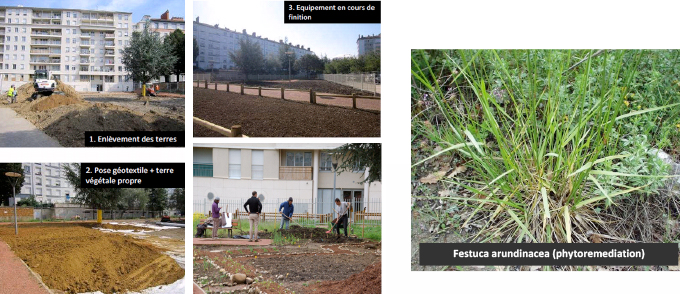Urban Garden soil pollution
28th August, 2013
Contributor: Lyon
The city of Lyon implements preventive and experimental actions to challenge the urban garden’s soil pollution.
Concept
As most of modern cities, Lyon’s soil is quite polluted due to an important industrial history. Regarding the boom of urban gardening, researches are now focusing on the health risks for users. Several studies have already shown that eating vegetables grown on urban soils could lead to serious issues. Last summer, the European Commission has sent a warning signal publishing a study that reveals the high concentrations of heavy metals in vegetable grown on Berlin’s central gardens (Cf. references below).
Pollution could also come from air, rain, water, fertilizers, pesticides, etc… Moreover, as vegetables react in different ways towards pollution, traces of polluted substances on a soil do not automatically mean the food that grew there, is unfit for human consumption. But the municipality that provides a land to cultivate fruits and vegetables for inhabitants is liable and accountable for health issues occurrence.
In Lyon, about 28 hectares of land used by community gardens and allotments are mostly situated on public space. Allotments are especially exposed to pollution due to their situation, historically taking place next to industrial areas, and lately near high traffic roads.
Even though, garden’s soil pollution is a difficult matter to talk about. People involved in urban collective gardens usually want to reconnect with nature, cultivating bare-hands and eating the products of their work. Finding out their garden’s soil contains pollutant traces can be a real shock.
Thus the city of Lyon implements prevention and proactive policies about garden’s soil pollution.
Result
The city of Lyon started to define a process involving:
Diagnostic
Since 2012, any community garden settled on a city owned land, can ask for a free soil diagnostic. Few of them have revealed heavy metal traces (lead, mercury, …). The city did provide clear information to all members of those “contaminated” gardens to avoid health risks: selected food to grow, best practices, etc.
Since then, soil pollution diagnostics are systematic for any new project of a community garden about to take place on a city owned land.
Topsoil replacement
The city planed to set up a garden in a residential area of Lyon. Unfortunately, the soil diagnostic confirmed the pollution suspected because of the place history: an ancient castle moat had been filled with some polluted embankment, banning any kind of growing on that place. The topsoil has been replaced and a healthy fruit and vegetable garden has grown up from this ground. The removed topsoil is cleaned in specialized areas.
Cost of the garden construction: 212 000 €
Cost of the soil clean-up operation: 26 000 € (12% of the total cost)
Phytoremediation experimentation
The phytoremediation is a soil decontamination process based on plants. Some species can catch pollutants and eliminate them.
This process is about to be experimented in Lyon. The species will be chosen in September and they should have cleaned an ancient parking soil after 4 to 6 years.
Benefits
Environmental benefits
Health benefits
Pro and Contra
Pro:
Phytoremediation: no extra cost and new green space in town
Anticipation and risk prevention
Awareness rising of the urban gardening issues
What are the lessons learn to be used/transferred/implemented in the other partner cities?
Anticipation of creation of new gardens (necessary for phytoremediation)
Diagnostic as early as possible
Inform users on good and bad practises/attitudes to avoid pollution contaminations
Question to the network
Other actions against pollution in gardens’ soil?
References:
Luc Bolévy, pollution engineer, Estate management Dpt of Lyon, luc.bolevy@mairie-lyon.fr
Bernard Maret, Garden and green areas, Dpt of Lyon: bernard.maret@mairire-lyon.fr
Environmental issues in allotments: Anne Pugnenat, Annales des mines, Responsibility and environment, n°24, October 2001
http://www.annales.org/re/2001/re10-2001/putegnat082-90.pdf
“Science for Environment Policy”: European Commission DG Environment News Alert Service, edited by SCU, The University of the West of England, Bristol. News Alert Issue 291 5 July 2012. http://ec.europa.eu/environment/integration/research/newsalert/pdf/291na1.pdf
JASSUR Project: Urban Community Gardens and sustainable cities. JASSUR project is intending to study functions, uses, and modalities of functioning and potential risks or dangers resulting from associative gardens, in emerging sustainable cities. http://www.agence-nationale-recherche.fr/en/anr-funded-project/?tx_lwmsuivibilan_pi2[CODE]=ANR-12-VBDU-0011
